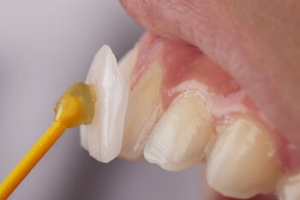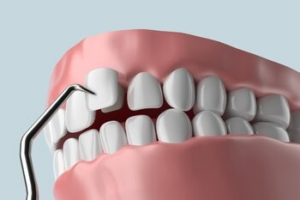Introduction
A perfect smile is a must-have for a confident and happy life. But missing teeth, whether from tooth decay, gum disease, or accidents, can make it challenging to get that perfect smile. Fortunately, dental veneers offer an excellent solution to replace missing teeth. In this blog post, we’ll delve into the details of veneers with missing teeth, their importance, and everything you need to know to achieve that smile you desire.
What are veneers?
Definition of Veneers
Dental veneers are customised, ultra-thin shells made of porcelain or composite resins bonded to the front of visible teeth to improve their appearance. Veneers are an option for those with a single tooth damaged by decay or trauma and those who want to replace missing teeth. Veneers can also be an excellent cosmetic fix for people with discoloured or stained teeth or those with teeth that are misaligned, uneven, or chipped.
Different Types of Veneers
When deciding between porcelain veneers and composite veneers, it’s important to consult with a dental professional who can assess your specific needs and provide personalised recommendations. Factors such as tooth shape, size, colour, and position will all play a role in determining which type of veneer is best for you.
In addition to their durability and stain resistance, porcelain veneers are known for their ability to mimic teeth’ natural look closely. Because porcelain veneers are made from a thin shell of porcelain that is custom fit to your teeth, they can create a more seamless, uniform appearance than composite veneers.
However, composite veneers have some advantages, such as being applied in a single visit and requiring less enamel to be removed from the tooth before placement. They can also be more easily repaired or replaced if damaged.
Ultimately, deciding between porcelain and composite veneers will depend on your needs and preferences. A dental professional can help guide you through decision-making and ensure you receive the best possible outcome for your smile.
The Procedure to Get Veneers
Getting veneers usually requires three visits to a dentist’s office. First, the dentist will take an impression of your teeth to create a customised veneer that suits your needs. Then, the dentist will remove a small amount of enamel from the existing teeth to make room for the veneer. After that, the veneer is bonded to the tooth, and then a strong light is used to harden the resin and connect it to the tooth. After the veneer is in place, you’ll need to take care of your oral hygiene properly to prevent gum disease and decay around the veneer.
What are Missing Teeth?
Causes of Missing Teeth
You may experience missing teeth for various reasons, including tooth decay, gum disease, trauma, and tooth removal due to orthodontic treatment. Tooth decay and gum diseases are caused by poor oral hygiene, which leads to bacteria and plaque buildup that can erode the tooth enamel and damage the gums. Trauma, such as accidents or dental injuries, can cause missing teeth due to tooth fractures, dislodgement, or complete tooth loss. Orthodontic treatments like braces may also require tooth removal to make space for other teeth and realign the bite.
Different Types of Missing Teeth
There are different types of missing teeth, including single teeth, multiple teeth, and full arch missing teeth. A single tooth loss can affect your bite, chewing, and speech and create gaps that may cause other teeth to shift. Multiple teeth missing can lead to further oral health issues, such as bone loss, gum recession, and bite problems. Full arch missing teeth, also known as edentulism, can affect your facial structure, speech, and ability to eat properly.
Consequences of Missing Teeth
Missing teeth can have consequences that go beyond aesthetics. They can affect your oral health, nutrition, and self-esteem. When you lose a tooth, the tooth root that supports the bone and gum tissue is also lost, which can lead to bone loss and gum recession. This can cause adjacent teeth to shift, which can affect your bite and cause further complications. Missing teeth can also make eating and speaking difficult, leading to malnutrition and speech impediments. Finally, missing teeth can also affect your self-esteem and confidence, leading to social anxiety and avoiding social situations.
Can Veneers Be Used to Replace Missing Teeth?
The answer is no. Veneers cannot be used to replace missing teeth. Veneers are cosmetic dental treatments designed to cover up imperfections on the surface of existing teeth. They do not have any structural support and cannot replace missing teeth. Missing teeth require more extensive treatments, such as dental implants, bridges, or dentures, specifically designed to replace the missing tooth or teeth and restore both the appearance and function of the mouth. Therefore, if you are missing one or more teeth, veneers are not an appropriate solution, and it is important to speak with a dental professional about the best options available for restoring your oral health and smile.
Conclusion
In conclusion, veneers can be used with missing teeth to improve the aesthetic of your smile. It’s also important to note that veneers require proper care and maintenance, just like your natural teeth. Regular visits to your dentist and proper oral hygiene practices can help maximise the lifespan of your veneers. Remember, a healthy and beautiful smile starts with good dental habits. While they may not be a permanent solution, they can be a great option for those who want to avoid more invasive procedures like dental implants or dentures. As with any dental work, it’s important to consult your dentist to determine the best treatment plan for your needs. If you want to learn more about veneers, schedule a consultation with us to discuss the best course of action for you.
References:
Randomised clinical trial on indirect resin composite and ceramic laminate veneers: Up to 10-year findings https://pubmed.ncbi.nlm.nih.gov/31181242/
Composite veneers: The direct-indirect technique revisited https://pubmed.ncbi.nlm.nih.gov/33336852/












